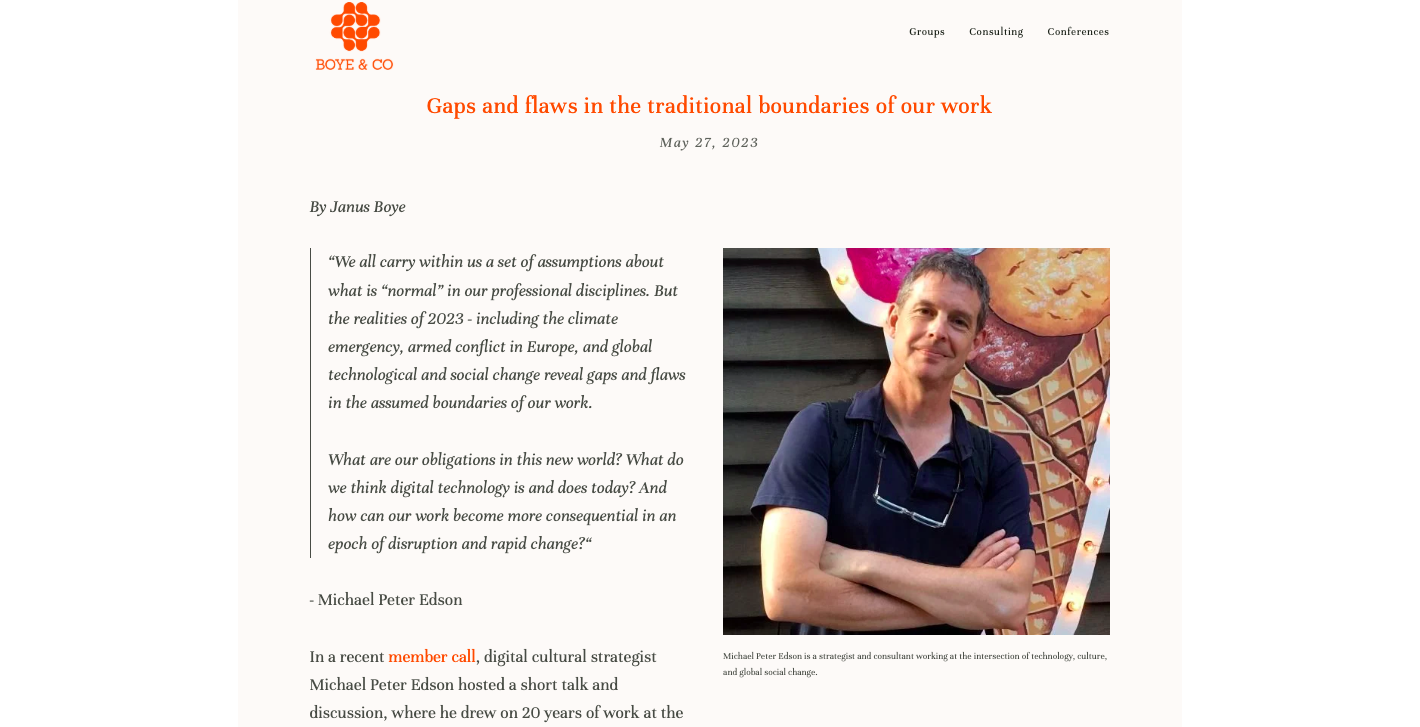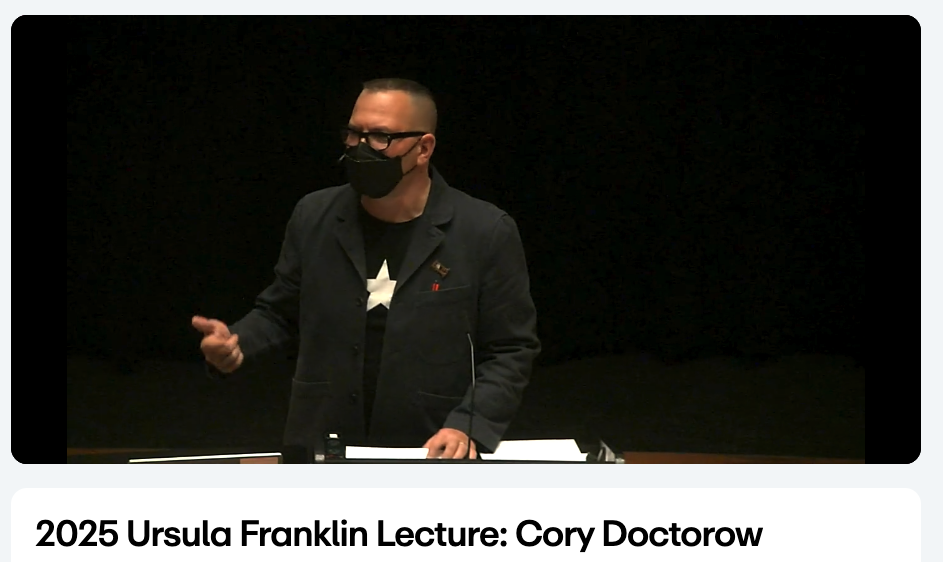Baristas and customers under video-analyzed surveillance. Via https://www.reddit.com/r/TechnologyShorts/comments/1r7zkqh/this_coffee_shop_uses_ai_to_track_the/
Virtue
The secret fear of the morally depraved is that virtue is actually common, and that they’re the ones who are alone. In Minnesota, all of the ideological cornerstones of MAGA have been proved false at once. Minnesotans, not the armed thugs of ICE and the Border Patrol, are brave. Minnesotans have shown that their community is socially cohesive — because of its diversity and not in spite of it. Minnesotans have found and loved one another in a world atomized by social media, where empty men have tried to fill their lonely soul with lies about their own inherent superiority. Minnesotans have preserved everything worthwhile about “Western civilization,” while armed brutes try to tear it down by force.
If you're serious about making history
The aide [to President George W. Bush] said that guys like me were “in what we call the reality-based community,” which he defined as people who “believe that solutions emerge from your judicious study of discernible reality.” I nodded and murmured something about enlightenment principles and empiricism. He cut me off. “That’s not the way the world really works anymore,” he continued.
“We’re an empire now, and when we act, we create our own reality. And while you’re studying that reality -- judiciously, as you will -- we’ll act again, creating other new realities, which you can study too, and that’s how things will sort out. We’re history’s actors . . . and you, all of you, will be left to just study what we do.”
There's a liberal knee-jerk in us which is just repelled by this language, by this refusal of the fact-based reality. But if you're serious about making history this is exactly how you act. This is exactly how you act. This is the template of how you would understand the process of making change. Of course, it ends in disaster…
Reference slides for Hands On! conference talk: Youth, Megacities, and the New Museums of the Future
A long, excruciatingly comprehensive set of “reference slides” (and work in progress) from my short, November 2025 talk at the Hands On! Conference at the Eureka! National Children’s Museum conference Liverpool.
At some point I’ll boil this down into a shorter, 20-30 slide summary but for now I wanted to try to lay out the whole case in all its glory, warts and all.
Download/view
PDF
Slides (via Google Slides)
Contents
Intro/overview: Why build a children’s museum (or any kind of museum) now?
Interlude — 3 stories
The world we live in — cultural revolution and axiological rifts
What does this mean for young people?
What does this mean for our institutions and practice?
Change is possible
Questions I often get at this point
Helpful frameworks (tools for thinking and working together)
The Big Frikin’ Wall; Zuckerman Quadrant; Think Big, Start Small, Move Fast, Activism, & etc
The emergence of children’s rights and the rights of future generations
Leverage Points in a System (Donella Meadows)
Examples - real-world inspiration (~60 projects)
Current work – bringing the vision to scale
Conclusion
More context (cross post from LinkedIn)
Reference slides for "Youth, Megacities, and the New Museums of Tomorrow" — a short talk I gave at the Hands On! - International Association of Children in Museums conference in Liverpool in November.
I'm arguing here...laying out the evidence and rationale...that we are in the midst of a cultural revolution — a "phase change" in the functioning of the world — that is driving a wedge between young people and their human right to shape and enjoy a common future.
These changes affect all of us profoundly, and in response, I think that children's museums — all knowledge, memory, and "cultural" institutions, really — need to dramatically reconsider their purpose, scope and methods.
We need to up our game, and fast.
As Greta Thunberg told the European Parliament in 2019, seemingly a thousand years ago, "Everyone and everything has to change. But the bigger your platform, the bigger your responsibility. The bigger your carbon footprint, the bigger your moral duty."
C02 is a big driver of the cultural revolution(s) and "rift" but as I see it, the main challenge lies in the combinatory effects of climate change and biodiversity loss, digital (Big Tech) and biotech, concentrations of wealth and power, and the advent of a new kind of change (accelerating, tipping points, delays between cause and effect) that exceeds our human capacity to think, learn, and make wise decisions in an era that needs, as Zeynep Tufekci says, "all the sociological imagination we can get."
That's *a lot* to take in. It's a big problem space and a big "ask" to figure out a new way to work and act in such an uncertain time. But the great systems thinker Donella Meadows observed that paradigms in transition are actually easier to change.
And the good news is that there are loads of inspiring, practical examples to draw from for those who have the curiosity and imagination to think about our institutions and practice in new way. I've included over 60 examples of projects, exhibits, and strategies in these reference slides as well as a dozen or so frameworks and "thinking tools" that I've found particularly useful over the years.
What is the road ahead? I think it's to move beyond the idea that young people are small "future adults" to be educated and toward the idea that young people are legitimate and forceful civic actors with the rights, capabilities, and moral standing to shape the world on their own terms.
But to achieve this paradigm change, young people everywhere need dramatically better allies and institutions from the world of adults, and there are lessons here for all of museum and cultural practice.
"I came away both slightly terrified about the world young people are growing up in and inspired to do something about it" is how session chair Nick Woodrow, a Board member at Eureka! described my talk, and terrified and inspired is how I feel too ;)
Now is the time of monsters
There’s also a looser translation of that last line that you hear sometimes: ‘Now is the time of monsters.’”
No room for youth
All technologies
Contradictory, confusing, inaccurate
Link/reference: Gaps and flaws in the traditional boundaries of our work
This is a good writeup of my ideas about creating new norms of practice in the cultural sector. (…I had kind of forgotten that I had put these ideas together so clearly!)
Gaps and Flaws in the Traditional Boundaries of Our Work, (PDF) summary of my presentation/discussion by Janus Boye.
What it means to be a professional in an epoch of accelerating change.
The Big Frikin’ Wall that stands between us / our organizations and the work we should be doing in society.
The “inner dialogue” we all have with the norms/expectations of our professional disciplines.
The “handoff” between different sectors of society.
The taboos around activism (“we have been miseducated…”).
Link to U.N. Museum TEDx talk
For the convenience of some new collaborators, I dumped the video and transcript of my 2016 TEDx talk about the Museum for the United Nations onto a convenience page here:
Perhaps unsurprisingly, the theme of top-down & bottom-up change, cultural institutions as catalysts for the know-how and creativity of others (rather than the instution as an exclusive/proprietary authority), and citizen participation is still relevant (and a largely unfulfilled vision) today.
“The Internet really is ass now”
Near-valueless concepts
An Advanced Civilization
Not preordained
Careless People, Facebook and de Tocqueville
For reference, this is the opening paragraph of Bleak House:
LONDON. Michaelmas Term lately over, and the Lord Chancellor sitting in Lincoln’s Inn Hall. Implacable November weather. As much mud in the streets as if the waters had but newly retired from the face of the earth, and it would not be wonderful to meet a Megalosaurus, forty feet long or so, waddling like an elephantine lizard up Holborn Hill. Smoke lowering down from chimney-pots, making a soft black drizzle, with flakes of soot in it as big as full-grown snow-flakes gone into mourning, one might imagine, for the death of the sun. Dogs, undistinguishable in mire. Horses, scarcely better; splashed to their very blinkers. Foot passengers, jostling one another’s umbrellas in a general infection of ill-temper, and losing their foot-hold at street-corners, where tens of thousands of other foot passengers have been slipping and sliding since the day broke (if the day ever broke), adding new deposits to the crust upon crust of mud, sticking at those points tenaciously to the pavement, and accumulating at compound interest.
Elon stopped believing in Mars
Only a void
Like the Russians in 1917, we live in an era of rapid, sometimes unacknowledged, change: economic, political, demographic, educational, social, and, above all, informational. We, too, exist in a permanent cacophony, where conflicting messages, right and left, true and false, fash across our screens all the time. Traditional religions are in long-term decline. Trusted institutions seem to be failing.
Techno-optimism has given way to techno-pessimism, a fear that technology now controls us in ways we can't understand. And in the hands of the New Obscurantists — who actively promote fear of illness, fear of nuclear war, fear of death, dread and anxiety are powerful weapons.
The supporters of the New Obscurantism have also broken with the ideals of Americas Founders, all of whom considered themselves to be men of the Enlightenment. Benjamin Franklin was not only a political thinker but a scientist and a brave advocate of smallpox inocula-tion. George Washington was fastidious about rejecting monarchy, restricting the power of the executive, and establishing the rule of law. Later American leaders - Lincoln, Roosevelt, King-quoted the Constitution and its authors to bolster their own arguments.
By contrast, this rising international elite is creating something very different: a society in which superstition defeats reason and logic, transparency vanishes, and the nefarious actions of political leaders are obscured behind a cloud of nonsense and distraction. There are no checks and balances in a world where only charisma matters, no rule of law in a world where emotion defeats reason—only a void that anyone with a shocking and compelling story can fill.




